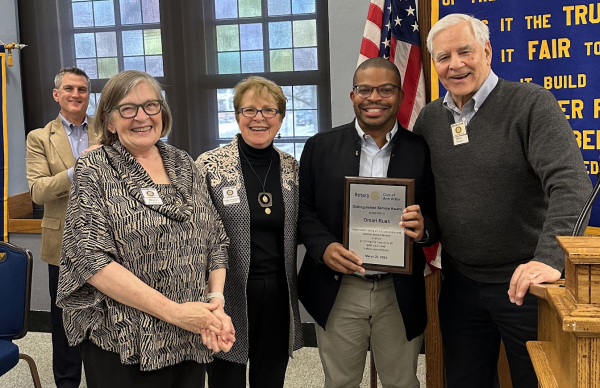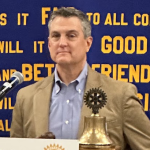
The room was abuzz with so many of our speaker Omari Rush’s friends and colleagues. President Mark Foster brought the meeting to order at 12:30 and Tom Strode started us off with God Bless America. Rosemarie Rowney told us how art, our speaker’s topic, can underscore how much more we are alike than we are different.
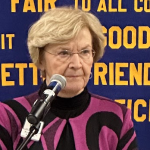
She quotes several of the artists whose work she saw at the Embracing Our Differences exhibit in Sarasota in February. Shelley MacMillan let us warm up with the original version of When You Are Smiling before tackling her version which celebrates the joy you share when you make art yourself.
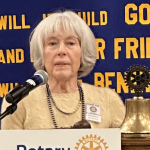
President Mark welcomed the many visitors as a group, expended thanks to the people who make the meeting run smoothly and announced birthdays. Marlena Studer announced a fundraiser for the Rotary Youth Exchange. This year Rotarian Sara Maddock, husband Todd, and twins Anneke and Ainsley will host a student from Japan. Our club will help host, and support a $200.00 per month allowance for the Pioneer student. The event is an evening of music and poetry, with audience participation, scheduled for Sunday, April 13, from 7:00 – 9:00pm at 704 Airport Blvd in Ann Arbor. More information is available on our website, along with a link to donate. Marlena will be sending evites but your can contact her immediately: marlenastuder@gmail.com.
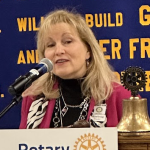
Leo Shedden, clad in optic yellow and armed with a pick stick, announced that our Adopt-a-Highway event will be Saturday, April 20, 2024. We will again meet at Kensington Hotel, refresh the safety briefing and don our safety vests, then head out to US 94 for our mile that stretches from State Street to Platt Road. A box lunch will be provided by the Kensington Hotel. This has always been a very good time for everyone, combining community service with friends. Sign up at adoptahighway@a2rotary.org.

Ken Fischer took the podium to tell us about extraordinary career of Omari Rush. Omari served an internship with University Musical Society when he was a music student playing clarinet pursuant to a career as a concert performer. After working with Ken and seeing the opportunities to learn, meet people, and have so many varied experiences in arts administration, he switched his focus. He remained on staff at UMS until 2014 – and was a Rotarian – when he began working in other arts organizations, not all focused on music. His dedication, imagination and skilled administration were rewarded with appointments to many executive positions and board appointments. Currently he is Executive Director of Culture Source, CultureSource is a member association for non-profit arts and cultural organizations in Southeast Michigan. Ken, Mary Avrakotos and Rosemarie Rowney presented Omari with the Distinguished Service Award for his work.
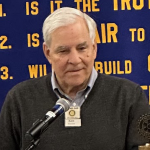
Notes from the Speaker
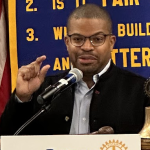
Omari gave a fascinating presentation about the state of the arts in Southeastern Michigan. He emphasized that art organizations are fluid, resilient, and creative. He talked about issues, problems and opportunities facing the arts, and their impact on communities.
First, covid was tough. The arts were the first areas to be cut both by individuals and business. People were not willing to gather for live performances, or spend money in a closed economy. The federal grant programs were vital in keeping arts alive. Groups learned to do more with less, and to mount digital events. Currently, audiences are up but subscriptions are down; demographics register heavily here. Investment is down.
Second, a thriving arts scene is an economic driver. Most of us remember the dead summers when students were gone in the 70’s and 80’s. Visionaries recognized that bringing people together would together create economic activity and that one way to do that would be to mount cultural activities around the Street Art Fair, which had been ongoing since 1959. Now the summer is even busier than the academic year between the arts, leisure activities, cultural offerings and SE Michigan’s beautiful natural environment. The surrounding communities have also invested in their arts infrastructure. The arts have become a major part of the economic activity of the area.
Third, technology has had a major impact on the arts. Audience expectations are very high and administrative costs are skyrocketing and ongoing. The duct tape that held arts organizations together for years can no longer hold. Audiences have a baseline competency with technology that makes it hard to connect.
Finally political appropriations are important to the functioning of arts organizations. The National Endowment for the Arts is a major funder. The federal government is encouraging incorporation of art in all departments, like art and music therapy in Health and Human services and Veterans Administration; broadband access in the Agriculture and Education Departments and even the military as service men and women deal with the tedium of active service.
Before taking questions, Omari pointed out to us that we all lead artful lives, from the clothes we choose to wear, through how we arrange out surroundings, what we choose to eat, and what we do in the evenings. Art informs our lives is so many ways we do not recognize.
Before leading us in reciting the Four Way Test, President Mark announced that next week’s speaker will be Chris Rizik, founder and Chief Executive Officer of Renaissance Venture Capital, speaking on “The State of Innovation and Venture Capital in SE Michigan.”
